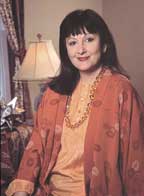Commerce with compassion

Amber Chand
Operating an online business from Williamstown, Massachusetts with links around the world, Amber Chand may serve as an object lesson in how conflict can confirm one's resolve.
Born and raised in Uganda of Indian parentage and educated in England, when she was 21 years old, her family was forced to leave their homeland and become refugees.
In August 1972, Idi Amin gave Uganda's 50,000 Asians (mostly Indians of Gujarati origin) 90 days to leave the country, following an alleged dream in which, he claimed, God told him to expel them. For Amber Chand and her family it was devastating.
"We were given three months to leave the country or we would have been shot on sight," recalls Chand. "As a result, I lost my home, my country and my father even died that year. I felt without any roots or national identity but did feel that I was a global citizen. So I needed to go into the world feeling very comfortable being somewhat nomadic."
She migrated to the University of Michigan in Ann Arbor where she studied under a four year scholarship. After graduation, she worked at a Linguistic Systems in Cambridge, Massachusetts translating documents for international clients. Banishment from her homeland had fueled a vision.
"That experience inspired me to really focus on issues of peace and peace-building. As a refugee there is a lot of violence being perpetrated on your life, so I wanted to find a way to be a woman who would seek to build bridges between people and being friendly by nature, it made sense to me that I would go out into the world and create a capacity for peace building," she recalls.
In 1998, she co-founded a company named Eziba, one of the dot com darlings that emerged at the decade's end, founded to support and promote global artisans.
"It was very pioneering, I and my partner, who had been with the World Bank, raised $40 million in venture capital. The vision was to support some of the poorest people on the planet who are also incredibly talented," she says.
Based in North Adams, Massachusetts, eziba.com operated for six years until a couple of major marketing mistakes forced it to close. But the experience paved the way for future efforts.
She notes, "For six years, I was schooled in this very well financed company and learned to network globally with artisan communities." Her travels overseas to Rwanda, the Middle East, Bolivia, Peru and India helped her develop the networks to support the development of her own company in November 2005.
Global Sourcing
That new company is the Amber Chand Collection; offering high-end crafts such as a beaded necklace and bracelet produced by a cooperative in northern Guatemala, a silk purse made in Cambodia, a basket woven from palm grass from Darfur, a Mayan bracelet woven with glass beads and a Jerusalem Candle of Hope produced by a collaboration of Israeli and Palestinian craftswomen.
The primary function of the Amber Chand Collection is to be a marketing force for the women while generating money for their families and communities.
In Guatemala, a percentage of the product's retail price supports a scholarship fund for the children, especially girls, to attend primary school; girls who probably would not otherwise have the opportunity to go to school. Similarly in Cambodia, five percent of the sales from the silk purse supports the House of Smiles, an orphanage for children severely disabled by landmine accidents.
The Business Model
"I'm a great believer in trying to circulate money as effectively as possible while still maintaining a strong, rigorous business," says Chand. "I pay the women above market rate for their services so they live on the money they receive and finance their children's education. At the same time, a percentage of profits goes to support a non-profit endeavor in the community."
"For my customers, I want to create an awareness of the exquisite artistry of these women who tend to face extremely difficult and challenging situations for most of their lives," she continued. "For the women, on the other hand, I want to create a market for them based not on their very sad story but on the fact that they have extraordinary skills."
Chand believes that for businesses to succeed in the 21st century they must shift their consciousness and not just focus on the bottom line
"When we see ourselves as connected to each other, then the way we conduct business is more collaborative and more of a partnership versus a supply chain," she says.
Aid to Artisans and World of Good are fair trade retail companies with similar missions to her business. However, Chand's Collection is distinctive in that it offers a model for peace building through "women's hands," and primarily with women as the inadvertent victims of war, genocide, civil strife, and works in highly fragile economies such as refugee camps and small workshops in volatile regions of the world.
"I work through email and through intermediaries that tend to be non-profit organizations based in Washington, D.C. with field operations in these countries. Because of the extremely precarious situations, I rely on the support of these groups," says Chand.
"The metrics of this company are to grow financially and be profitable in a reasonable way and at the same time to support children going to school, women having food on their tables and part of the company's success is measured by its social impact," she adds.
"I have never been happier in my life," says Ms. Chand, a woman working to fulfill her dream, a dream sparked ironically by a dictator who later was forced from power and died in exile.
The Amber Chand Collection and the stories behind it can be viewed at www.amberchand.com.
